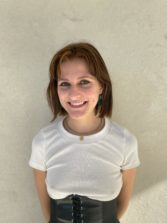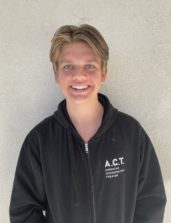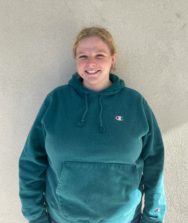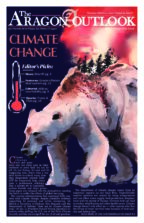Ava (V) Tolmasoff, Mr. Rogers

Tell me about your character.
I play Mr. Rogers who goes by they/them pronouns in the play. I am French in the play and I really do love my character because they’re kind of a butler in a way and I go on and off stage a lot because I’m taking things. I take clothing items like coats [and] hats. My character is really close with the wife, Mrs. Rogers.
What was your experience in theater like during the pandemic? How was it different?
I got into … “Shakespeare in Love” in my sophomore year [when] we did not get to put on [in-person performances] because of COVID-19. During the pandemic, I was still in drama class. We did a lot of fun things like the Young Playwrights Project, which I [auditioned for and] got into, but I wasn’t able to do any [live] productions.
What was [the] play that you decided to write [for the Young Playwrights Project]?
I wrote one called “Her.” Seven to nine of us were picked for professional actors to perform it. Mine was about a woman who worked at a coffee shop and her wife had passed from cancer. [It was] a whole LGBTQ+ representation story. It’s just her story about how she has moved on and is trying to find somebody new.
Kaelyn Luebke, Very Claythorne

Tell me about your character.
My character is Vera Claythorne and I think she’s 24-years-old. She’s a secretary. From what I interpret, she’s a pretty smart and witty person who has some aspects to her that are a bit anti-feminist. I think that’s because of [how] the play was written.
How do you get into character while performing?
I’ve probably watched the actual “And Then There Were None” movie like three times. I kind of observe [Vera’s] body movements, posture, language, her voice, certain actions [and] how she feels towards the other characters. I kind of try to absorb that stuff for my own character and how I portray Vera. As a theater community, we kind of have this ongoing thing of talking in a British accent.
What was your theater experience like during the pandemic?
I took Advanced Drama during … the pandemic. It was hard acting. Film acting is a lot different from acting in person. You don’t get that same sense of community and the relationships and bonds that you form with people that you’re working with and acting with. I think Mr. Smuin did a really good job of [adapting]the class. It was different from in-person acting. You kind of got to see another side of acting and theater, which is that film side, so I thought that it was fun and interesting to do.
How is rehearsing now that we’re back in person but still during a pandemic?
Honestly, I’m okay with masks. If anything, it changes how we act for the better because we can’t just rely on face acting [to] portray our emotions.
How would your character respond to being accused of being the murderer?
Well, as it says previously in the script, I am a woman. There’s a lot of sexist comments about that. But also, I don’t have a good motive for it. There’s nothing that would benefit me from killing someone.
Deirdre Doyle, Emily Brent

Tell me about the character you’re playing.
I play Miss Emily Brent. She is an elderly lady … [who is] a little stuck-up. She’s religious [and] loves knitting. She’s not a very nice lady and she really doesn’t like young people.
How do you transition into character when performing?
Knitting really helps. I kind of give myself a thought process where I’m like, “Okay, I’m better than everyone. I love God.” Like not in the sarcastic way. I just give myself those kinds of thoughts and affirmations to get myself into that character. I also have a specific vocal choice. She’s high-pitched and old-sounding.
As a suspect, what is your character’s defense against being the murderer?
“There is no question of defense. I have always acted upon the dictates of my conscience.”
What is it like now performing and rehearsing during the pandemic? How is it different?
In terms of actually acting with the masks, it doesn’t really make a difference. A lot of actors are very good at emphasizing with their eyes. Mostly it’s body language and vocal choices that we use to give each other cues about how we need to perform. Actually, performing with the masks and having to figure that out, it’s been a little difficult. Just trying to figure out … how we would do facial expressions [and] things like that [is difficult].
Seth Weinfield, Anthony Marston

Tell me about your character. How do you relate to him?
My character’s name is Anthony Marston. He comes from a very affluent background. He’s very used to having everything in his life handed to him. He doesn’t like when people get in his way, so he’s basically a spoiled narcissist. It’s a super fun character to play. I hope I don’t relate to him, but I would say I think we all have moments where we feel self-confident and border on too much self-confidence.
How has your character’s accent affected your acting?
I’ve been thinking about delivering it with an American accent, but there would be a possibility of it being in a British accent. The original role is British and I know that a lot of my peers are delivering their roles in a British accent. Part of why I would keep it in an American accent is because I think it would add a really interesting layer to the character if he contrasted a lot [with] others and was American.
Kamaile Zimmerman, Mrs. Rogers

Tell me about your character. Do you relate to her?
My character is Ethel Rogers. She is the maid [and] personal chef on the island, and [her] job is basically to take care of the guests. She has a lot of anxiety, she’s really suspicious of all the people on the island with her and she is not a fan of cleaning up. Right off the bat, she just doesn’t feel comfortable around the other guests and that sort of leads her to go a little crazy. I definitely relate to the anxiety part. When I’m in a social situation where I don’t know too many people, I get a lot of anxiety sometimes, so playing that part [and] putting that aspect into the character was a lot easier than I thought.
How do you get into character while performing?
I just listen to the certain type of music that I think would fit her character, so something ominous and something weird. Then, I [am] be in the zone for murder mystery.
What was your experience with theater like during the pandemic? How was it different?
It was interesting. Since it was all online, I didn’t really do much with it. The only theater thing I did was through Aragon drama and it wasn’t the same as in-person. It was very different. We didn’t really do many shows. We didn’t do many scenes. It was basically about writing. It was more about writing your own scenes and writing your own monologues instead of just acting them. So now since we’re back in person, we’re doing all this stuff with characters and facial expressions, but, online, since you’re limited, it was mainly about volume control and writing.
Jane Palladino, Dame Laura Wargrave

Tell me about your character. How do you relate to her?
I play Dame Laura Wargrave and she is a judge in England. She’s very solemn and serious. One thing I relate to about Wargrave is that I am an observant person.
Your character was originally written as a man. How was the decision made to switch the gender?
Mr. Smuin made the decision to switch the gender of my character. I’m happy that [he] made [this] change because it’s cool to play the judge as a woman, especially considering this takes place in the early to mid 1900s. I love the switch.



